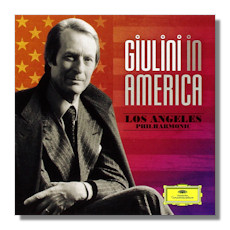
The Internet's Premier Classical Music Source
Related Links
-
Beethoven Reviews
Brahms Reviews
Debussy Reviews
Ravel Reviews
Schumann Reviews
Tchaikovsky Reviews - Latest Reviews
- More Reviews
-
By Composer
-
Collections
DVD & Blu-ray
Books
Concert Reviews
Articles/Interviews
Software
Audio
Search Amazon
Recommended Links
Site News
 CD Review
CD Review
Giulini in America I

The Los Angeles Recordings
- Ludwig van Beethoven:
- Symphony #3 "Eroica"
- Symphony #5
- Symphony #6 "Pastoral"
- Johannes Brahms:
- Symphony #1
- Symphony #2
- Claude Debussy: La Mer
- Maurice Ravel:
- Ma mère l'Oye
- Rapsodie espagnole
- Robert Schumann:
- Overture "Manfred", Op. 115
- Symphony #3 "Rhenish"
- Piotr Ilyitch Tchaikovsky: Symphony #6 "Pathétique"
Los Angeles Philharmonic Orchestra/Carlo Maria Giulini
Deutsche Grammophon 4778840 6CDs
These unfailingly measured and dignified performances will not be to all tastes, and yet every single work testifies to the genuine chemistry between a master and his charges. While the Los Angeles Philharmonic would later make its name championing new music, under Giulini they brought new life to the classics. From 1978-1984, the legendary maestro took a group of eager young musicians and introduced the world to a whole new way of hearing music that audiences thought they knew.
This is not an exaggeration. The Brahms Symphonies are both massive in conception, and almost spiritual in approach. Compare this to Chailly's rushed and clipped efforts on Decca; here is a true, rich Brahms sound. Every phrase and measure gets attention, and such is the genius of the conductor that nothing ever drags. The Beethoven Symphonies #5 and #6 are highly distinctive. While the #5 may no longer be the revelation it was upon release, it's still very fine, with an especially gripping set of outer movements. The Pastoral is "Klemperer comes to Los Angeles", a broad and loving reading that favors the woodwinds. Only the Eroica misfires, a reading that is simply too pulled about to qualify as a top choice. Still, even here one has to admire the conductor's vision and his players' response.
And vision is the key word here. Those Beethoven and Brahms pieces would have been dead from the start without Giulini's heartfelt and painstaking care with dynamics and detail. This also pays off in Schumann, a composer who you wouldn't think responds well to Giulini's particular mix of grandiosity and profundity. Well, guess what? The Rhenish is one of the finest I've heard, clear in terms of balances but also unquestionably serious and large-scaled. Somehow Giulini manages to allow everything to cut through the textures effectively, all while retaining a "big" sound. I suspect that his ability to get his Los Angeles forces to follow his every whim dynamically speaking really helps. The work sounds better than ever. Chailly – again on Decca – had me convinced that this kind of reading was only possible with the Mahler orchestrations; I'm less sure now! The Manfred is just as fine.
Giulini also conducted a reasonable amount of Ravel and Tchaikovsky, as well as some Debussy. La Mer was a signature piece for him, and all of his versions are worth hearing. This is one of the best, if not the best he ever gave us. It's beyond beautiful, while also splashy and full of color. Ditto for the Ravel works, which are outstanding and will probably have you second-guessing if this is Giulini. It is; check out the amount of energy that goes into phrasing each section, or demanding that each orchestral voice be heard. If the Tchaikovsky isn't the best ever, it's a great document of what this orchestra can do in this music (Mehta recorded the work with these forces too, also well done).
To this point, I have said very little about the orchestra save for some rather general praise, but the Los Angeles Philharmonic is amazing here. Even in the outings that prove less than successful (the overly studied Eroica) they play with tremendous commitment to Giulini's vision. And when things do go right (everything else), the results are frankly unmatched. "Giulini in America II" is the Chicago sequel to this set and seems to have gotten more critical attention, but since these recordings are rarer and feature an ensemble upon which it was arguably easier to put a personal stamp upon, I favor this box. And while the Beethoven and Brahms might take some getting used to, the time is very well spent if you choose to make the effort. As for the Schumann and French selections, they are classics loved around the world. Go for it.
Copyright © 2014, Brian Wigman




















